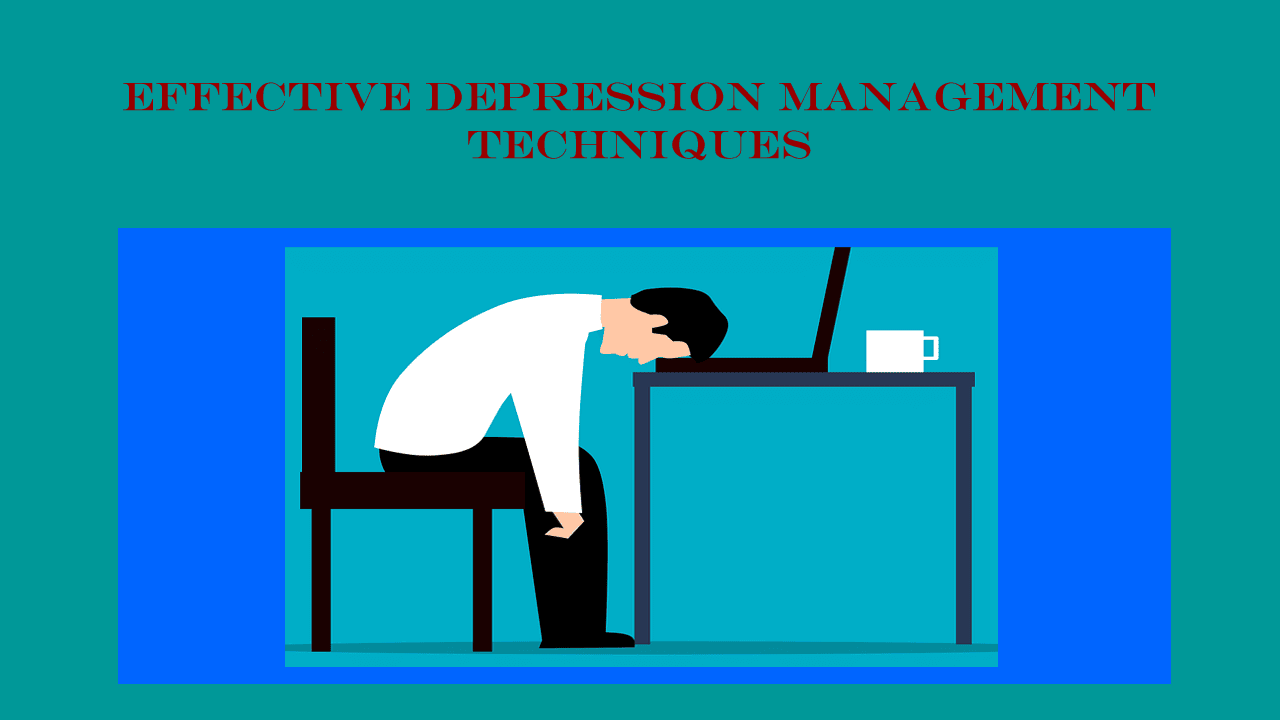Welcome to our exploration of the complex world of depression! Although depression can be a challenging topic to discuss, it’s important to understand for those who may be directly or indirectly affected by it. In the article “Effective Depression Management Techniques”, we will dive deep into the causes, symptoms, and treatments for depression, providing insights and guidance that can assist you or your loved ones in better managing this condition. From conventional approaches such as therapy and medication to alternative options like mindfulness meditation and exercise, we will cover a range of strategies that can help you achieve greater well-being and a brighter future. So let’s embark on this journey together and discover the hope and healing that awaits.
Indicators of a Healthy Human Mind and Body
Normal human beings exhibit a wide range of physical, emotional, and cognitive characteristics. Examples of healthy physical signs include adequate sleep, a balanced diet, and regular exercise, while emotional signs may include the ability to regulate emotions, maintain positive relationships, and experience joy and contentment. Cognitive signs of health include effective critical thinking, problem-solving, and decision-making skills. While everyone may face challenges in these areas occasionally, recognizing and promoting these signs of well-being can provide a useful framework for understanding what it means to be a healthy and functional human being.
What is depression and how does it affect daily life?
Depression is a mental health disorder that impacts a person’s emotional well-being, leading to feelings of sadness, hopelessness, and disinterest in activities they once enjoyed. Depression can significantly affect daily life by causing sleep problems, changes in appetite, low energy levels, and difficulty concentrating. Although everyone experiences some form of stress or sadness, depression is a more severe and chronic condition that often requires professional help to overcome. The good news is that depression is treatable with a combination of therapies, medication, and lifestyle changes. Seeking help is crucial if you or someone you know is showing symptoms of depression to improve overall mental health and well-being.
Demographics of Depression
Depression is a mental health condition that can affect anyone, regardless of age, gender, race, or socioeconomic status. However, certain groups may be more susceptible due to a range of factors, such as genetics, life experiences, and societal pressures. Women, for instance, are twice as likely as men to experience depression, and individuals with a family history of depression may be more vulnerable. Other factors, including poverty, chronic illness, and trauma, can also increase the risk. Understanding the demographics of depression can help identify those who may be more vulnerable and ensure they receive appropriate support and resources to manage their symptoms.
Depression Warning Signs and Symptoms
Depression is a complex mental health condition that can impact individuals in different ways. It’s important to recognize the warning signs and symptoms of depression to help prevent the condition from worsening. Some common indicators of depression include persistent feelings of sadness, a lack of interest in activities once enjoyed, changes in appetite or sleep patterns, and difficulty concentrating or making decisions. Physical symptoms such as headaches and muscle pain may also be present. It’s crucial to seek professional help if you or someone you know is experiencing these symptoms, as timely intervention and effective treatment can make a significant difference in managing depression.
What are the 3 levels of depression?
Depression affects people in different ways, and mental health professionals may use diagnostic categories such as mild, moderate, and severe depression to assess its severity. These categories can inform the appropriate treatment and support needed to manage symptoms. However, it’s important to remember that each person’s experience of depression is unique, and seeking professional help is crucial, regardless of any specific diagnostic labels.
Understanding the Root Causes of Depression
Depression is a widely prevalent mental health condition with several underlying causes that can contribute to its development. Here are some primary causes of depression:
Biological Factors: Depression can occur due to chemical imbalances in the brain, genetics, or other physical health conditions.
Life Experiences: Traumatic life events such as loss of a loved one, financial difficulties, or relationship issues, can trigger depression. Chronic stress in high-pressure work environments can also contribute.
Psychological Factors: Negative thought patterns, low self-esteem, and other psychological factors can contribute to the development of depression.
Substance Abuse: Substance abuse, particularly drugs and alcohol, is strongly linked to depression.
Understanding these causes can help healthcare professionals and individuals identify potential risk factors and develop effective treatment plans. Seeking professional help for depression is crucial, as early intervention can improve outcomes and overall quality of life.
Diagnosing Depression: Understanding the Process
Depression is a complex mental health condition that requires a thorough diagnosis by a qualified healthcare professional. By understanding the depression diagnosis process, individuals can work with healthcare professionals to receive an accurate diagnosis and develop a comprehensive treatment plan. Seeking professional help if experiencing symptoms of depression is crucial, as early intervention can improve outcomes and overall quality of life. The diagnosis process involves several steps:-
Initial Assessment: Healthcare professionals may begin by conducting an initial assessment, which may include a physical examination, discussion of symptoms, and review of medical history.
Mental Health Evaluation: Mental health evaluations may be conducted to assess symptoms of depression and other mental health conditions. These evaluations may include questionnaires or interviews with a mental health professional.
DSM-5 Criteria: The Diagnostic and Statistical Manual of Mental Disorders (DSM-5) is a widely used diagnostic tool for mental health conditions. Healthcare professionals may use the criteria outlined in the DSM-5 to diagnose depression.
Exclusion of Other Conditions: Healthcare professionals may also conduct tests or exams to rule out other medical conditions that may be causing symptoms similar to depression.
Read More -10 Unique Techniques to build self-confidence
Alternative Treatments for Depression
Effective Depression Management Techniques
Alternative treatments for depression can be effective for some individuals in addition to traditional therapy and medication. Here are a few alternative treatments that have shown promise:
- Exercise: Regular exercise has been shown to improve mood and reduce symptoms of depression.
- Mindfulness meditation: Practicing mindfulness can help individuals become more aware of their thoughts and emotions and manage them more effectively.
- Acupuncture: This traditional Chinese medicine practice has been found to alleviate depression symptoms in some individuals.
It’s important to note that alternative treatments should never replace traditional treatments and should be discussed with a healthcare professional before trying. It’s also essential to continue any prescribed medication and therapy while exploring alternative treatments.
Mindfulness Meditation for Depression Treatment
If you’re looking for a natural and effective way to manage depression, mindfulness meditation may be worth considering. Here’s a step-by-step guide on how to practice mindfulness meditation for depression treatment:
Step 1: Choose a comfortable and quiet place where you can meditate without distractions. Sit on a cushion or chair with your back straight and your feet flat on the ground.
Step 2: Take a few deep breaths, inhaling through your nose and exhaling through your mouth.
Step 3: Focus your attention on your breath, noticing the sensation of the air moving in and out of your body.
Step 4: If your mind starts to wander, gently bring your attention back to your breath. You can count your breaths or repeat a calming phrase, like “peace” or “relax,” to help you focus.
Step 5: As you continue to focus on your breath, try to observe any thoughts or emotions that come up without judging them. Simply acknowledge them and let them pass without getting attached to them.
Step 6: Practice mindfulness meditation for at least 10 to 15 minutes each day. Gradually increase the amount of time as you become more comfortable with the practice.
Research shows that mindfulness meditation can help reduce stress, increase relaxation, and improve overall well-being, making it a promising option for those with depression. However, it’s important to note that mindfulness meditation should not replace traditional treatments for depression and should always be discussed with a healthcare professional.
When to seek medical help for depression
If you’re experiencing persistent feelings of sadness, hopelessness, or worthlessness, along with changes in sleep patterns, appetite, and energy levels, it may be time to seek professional help for depression. Additionally, if you’re having thoughts of self-harm or suicide, immediate medical attention is necessary. A healthcare professional can evaluate your symptoms and provide a diagnosis, as well as develop a comprehensive treatment plan that may include therapy, medication, or a combination of both. It’s important to seek help early, as early intervention can improve outcomes and overall quality of life.
We hope that this exploration into the world of depression has provided you with valuable information and insights. We understand that living with depression can be a challenging journey, but with the right tools and resources, it is possible to achieve greater well-being and fulfillment. Remember that seeking help for depression is a brave step, and there is no shame in asking for assistance. By taking an active approach to self-care and working with healthcare professionals, individuals with depression can overcome their challenges and find hope for a brighter future. Let’s move forward with renewed purpose and support each other on our journey toward optimal mental health.
-
How to start a YouTube channel and make money
As you embark on the journey through this blog, we want to extend a warm welcome and an invitation to read our article ” How to start a YouTube channel and make money” with care and attention. Each word and idea has been carefully crafted to provide you with valuable insights, knowledge, and perspectives. We…
-
Benefits of Cow Urine
In natural remedies and holistic health, cow urine has emerged as a subject of growing interest. While the idea of using cow urine may seem unconventional to some, it has been a part of traditional Ayurvedic medicine for centuries. This age-old elixir, known as “gomutra” in Sanskrit, has recently garnered attention for its potential health…
-
Technology Skills for Kids and Teens
Welcome, Friends! We invite you to dive into our article titled “Technology Skills for Kids and Teens.” It’s a comprehensive guide packed with valuable insights on developing essential technology skills. Take a moment to read the complete article and discover the importance of empowering young minds in the digital age. In today’s digital age, technology…

